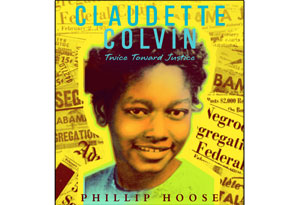Meet the Original "Rosa Parks"

What do the following people have in common?
Christopher Columbus was not the first European to cross the Atlantic—Viking Leif Erickson did it 500 years earlier. Elvis didn't invent rock 'n' roll—Chuck Berry and Little Richard did.
And while Rosa Parks is famously remembered for refusing to give up her seat on a public bus—the act of civil disobedience that sparked the Montgomery Bus Boycott and eventually lead to the Supreme Court's invalidation of "separate but equal" segregation—she wasn't the first woman to challenge the segregated bus laws of Montgomery, Alabama. A 15-year-old schoolgirl had done the same thing nine months earlier.
The story of that girl is told in Claudette Colvin: Twice Toward Justice, the 2009 National Book Award winner in the Young People's Lit category. Author Phillip Hoose weaves together the richly detailed memories of the now-septuagenarian Colvin into the context of the burgeoning civil rights movement and the brutal oppression of Jim Crow South that treated black Americans as second-class citizens.
But how could so few people know her story until now?
"Important things get left out," Hoose says. "And after time, maybe it's inevitable, history gets consolidated into a few characters, and any important episode gets more about a couple people as time progresses."
- Christopher Columbus
- Elvis Presley
- Rosa Parks
Christopher Columbus was not the first European to cross the Atlantic—Viking Leif Erickson did it 500 years earlier. Elvis didn't invent rock 'n' roll—Chuck Berry and Little Richard did.
And while Rosa Parks is famously remembered for refusing to give up her seat on a public bus—the act of civil disobedience that sparked the Montgomery Bus Boycott and eventually lead to the Supreme Court's invalidation of "separate but equal" segregation—she wasn't the first woman to challenge the segregated bus laws of Montgomery, Alabama. A 15-year-old schoolgirl had done the same thing nine months earlier.
The story of that girl is told in Claudette Colvin: Twice Toward Justice, the 2009 National Book Award winner in the Young People's Lit category. Author Phillip Hoose weaves together the richly detailed memories of the now-septuagenarian Colvin into the context of the burgeoning civil rights movement and the brutal oppression of Jim Crow South that treated black Americans as second-class citizens.
But how could so few people know her story until now?
"Important things get left out," Hoose says. "And after time, maybe it's inevitable, history gets consolidated into a few characters, and any important episode gets more about a couple people as time progresses."



